The Manosphere, while unmistakably vile and dangerous, is also run and followed by a bunch of whinging toddlers. Waah, waah, waah, they stomp their little feet, I’m not getting my way! They pout out their little lower lips and snivel, Girls are mean.
What a pack of clueless dorks.
The most obvious stupid thing about these fools is their styling and selling themselves as Hero-Victim. That’s like being a valiant doormat. And, to compound this obvious stupidity, they hold up none other than Little Donnie Trump as their Hero-Victim-in-Chief.
Because who whines better than Little Donnie?
From Day One, Little Donnie has made it his whole political schtick to be the Hero-Victim. One minute he’s pounding his hollow little chest about being the biggest-baddest Dude of all-time descended from heaven to Make America Great Again. The next minute he’s screwing up his weaselly little face to sulk about everybody being so mean-and-nasty to him.
Waah! I’m the most witch-hunted Little Donnie of all time ever in the history of the universe like you wouldn’t believe! Waah!
Golly, what’s it gonna be, Little Donnie? He-Man or Milquetoast? Unstoppable Force or Helpless Waif?
Examples of Little Donnie’s absurd doublethink abound. Here’s one he posted on his social bullshit—er, I mean media—site even after he won this past election:
There has never been a President who was so evilly and illegally treated as I. Corrupt Democrat judges and prosecutors have gone against a political opponent of a President, ME, at levels of injustice never seen before.
Jeez.
But the Manosphere laps it up like dogs jostling around a puddle of fresh puke.
Why?
Many journalists and academics have written on the phenomenon of Little Donnie’s Hero-Victim complex. They often identify the strategy as grievance politics. (See, for example, here; or just Google something like “Trump as victim” and lots will pop up.) However, the purpose of this post is not to rehearse or to demonstrate any further Trump’s ridiculous—yet effective—tactic.
Instead, I’m going to explore the underlying layer of culture—one that might be uniquely American—that nourishes this moronic Manosphere mindset.
You’ll recognize the trope immediately. It’s a commonplace that serves as the backbone of our national mythology. It’s a tall tale we tell ourselves to define “the American character.” In fact, when I asked AI to “create an image that embodies the essence of the American character,” this is what it rendered.
In truth, what AI rendered is nothing more than a 21st-century version of this:
I don’t know about you, but I find it pretty creepy that this is what AI comes up with when its large language model is sent scurrying after “the essence of the American character.”
Blubbering Cowboys
I’ll start my investigation of American culture by quoting, at a bit of length, two British media experts, Lilie Chouliaraki and Kathryn Claire Higgins, writing on grievance as a form of political communication.
Fundamentally, ... grievance is about pain that has long been felt without recognition or resolution. And we cannot explain its appeal, unless we grasp how pain participates in politics and how it can be leveraged for electoral gains. What’s important to note is that being in pain is not a singular concept, but a powerful language that connects communities through shared feelings of hurt and neglect, hate and resentment, hope and gratitude. The victim has entitlements to empathy, compassion and often legal protection; it has moral worth and social capital. And there is no victim without those responsible for the infliction or relief of its suffering: a perpetrator to be castigated for inflicting the suffering, and a benefactor who promises to soothe the victimized public precisely where it hurts. These roles—victim, perpetrator, benefactor—are not set in stone once and for all but are key stakes in political struggles for visibility, recognition and power. And it is these roles and their relations that help illuminate Trump’s electoral game and ultimate victory. [italics added]
Obviously, in this formula described above, Trump is posing as the “benefactor” for the politically aggrieved. That is, exactly as with his make-believe “Hero” role, he’s pretending to be the Savior who will guide them to the Promised Land of recognition and resolution.
My interest, however, lies in examining who, exactly, is the imaginary “victim” in this American political fiction (in the same sense as the Manosphere considers itself to be a “Victim”) and, equally, who has been cast to play the sensationalized role of “perpetrator” (the wicked ne’er-do-well) in this American theater of the absurd.
The answers are not hard to figure out.
Needless to say, manly white men—like those “essential American character” dudes pictured above—are the political “victims” in the MAGA cloud-cuckoo-land. And while Trump, of course, vilifies the “WOKE” and “the loony left” and “radical Marxists” (and so on and so forth ad nauseum) as “the enemy within” in order to rile up his beef-fed base, I think it no stretch to assert that his most hated and feared target is Women.
Women scare the hell out of Trump—and out of the Manosphere. Thus, women are made out to be one of the leading, if not the primary, causes of grievance in the MAGA fever dream. That is to say, women are the “perpetrators” of political pain and suffering for the Manosphere.
Waah.
It also goes without saying that this kind of misogyny is nothing new in American life. Such a dread and dislike of women is foundational to our American myth of—again, as pictured above—manly freedom and individuality. In America, manly white guys must be free to ride the range—or, nowadays, drive off into the sunset in their pickup trucks. Women, it seems, only get in the way of this Great American Man Freedom.
Yeah. Waah...
Here’ a group shot of these manly white men/blubbering wannabe cowboys at one of their more memorable jamborees:
To explain how and why this American cultural phenomenon has come about, it’s time I introduce the cultural-theory star of this post, critic and scholar of American literature, Nina Baym (1936-2018). In particular, we’ll take a look at her influential essay, “Melodramas of Beset Manhood: How Theories of American Fiction Exclude Women Authors” (1981).
Baym vs. The Boys
As you can see by its subtitle, Baym’s essay is one of metacriticism. That is, she’s not offering a critique of American literature; rather, she’s offering a critique of the existing body of academic criticism being written about American literature. Specifically, Baym reveals how male critics of American literature pursue a skewed and sexist reading of that literature in order to construct a canon of “great” American works that are all authored by male writers.
Yeah, I know. Sad. But, as in any other field, the exercise of deeply ingrained social bigotries happens all the time in academia. Thus, Baym is delivering a swift kick in the googlies to the scholastic patriarchy.
For our purposes, though, we need not dig into the details of Baym’s analysis of the formation of the American novel canon by sexist critics. Instead, we’ll focus on Baym’s extended discussion of the quintessential myth and promise of America—a mythology that drives much of our American storytelling, first in novels and then in television and film.
What is this definitive American tale? You’ll recognize its outline instantly: the rugged individual man, armed only with his bootstraps, making his own way in an unspoiled wilderness without the help or, more important, the hindrance of society.
Here’s another visual for this all-American myth, just in case you’re having trouble picturing it.
Baym points out how this deeply romantic American idea of a new land, untrammeled by history or social limits, promises the fantasy of a solitary person being able to achieve complete self-definition. Moreover, writes Baym:
Behind this promise is the assurance that individuals come before society, that they exist in some meaningful sense prior to, and apart from, societies in which they happen to find themselves. The myth also holds that, as something artificial and secondary to human nature, society exerts an unmitigatedly destructive pressure on individuality.
Here we see the seeds of both individualism and exceptionalism, two ideologies that Americans—and especially American men—love to believe about ourselves. These self-aggrandizing illusions not only fuel our popular culture, but power our politics.
Given America’s origins as vast tracts of what Europeans saw as virgin territory for the taking, it makes sense that, as Baym notes, “the essential quality of America comes to reside in its unsettled wilderness and the opportunities that such a wilderness offers to the individual as the medium on which he may inscribe, unhindered, his own destiny and his own nature.”
The “he” and “his” in that sentence, of course, are quite intentional on Baym’s part.
In early American society, the kind of personal mobility necessary to light out for the western territories by oneself was overwhelmingly a male prerogative. No wonder, then, that the loner-heroes of American lore are always men undergoing some manner of rough-country adventure. From James Fenimore Cooper’s “Leatherstocking” novels to every cowboy movie starring John Wayne to Jake Sully on Pandora, we thrill to watch intrepid male mavericks evade the snare of their home society in order to self-determine their male soul in exotic landscapes.
And where do women fit into this man-centric American mythology? The usual.
Either as bitches or babes.
Emasculating Bitches or Obedient Babes
The second key aspect of this American myth of individuality, according to Baym, is its being sexualized. That is, if the rugged individual is understood to be male, then both what he runs from—society—and what he runs toward—the wilderness—are understood to be female.
Baym explains how “the entrammelling society and the promising landscape” alike “are depicted in unmistakably feminine terms”; moreover, this sexual definition “has melodramatic, misogynist implications.” Men find themselves, so runs the myth, torn between these two powerful female influences: trapped by society or free in the wilderness.
On the side of domestication, “the encroaching, constricting, destroying society is represented with particular urgency in the figure of one or more women.” Baym characterizes such women as being in “the melodramatic role of temptress, antagonist, obstacle”; that is, a women whose mission in life seems to be to ensnare the man and “deflect him from life’s important purposes of self-discovery and self-assertion.”
In short, such women are emasculating bitches.
One standard character of this type is the “ball-and-chain” figure, such as Daisy Buchanan in The Great Gatsby (1925). Daisy ruins Jay Gatsby’s gallant attainment of the American Dream—that is, enjoying his fabulous wealth. Another common hindrance to a man’s heroic self-actualization is the “civilizing woman.” Such nuisances can take a number of forms. One is the “concerned wife or sweetheart” slowly trying to grind her man down into a tedious social conformity. Examples are Marian Starrett in the film Shane (1953) or Sarah Wheeler in Pale Rider (1985).
More recent examples of what might also be called the “love interest” character include Mary Jane Watson in Spider-Man (2002), Pepper Potts in Iron Man 3 (2013), and Sharon Carter in Captain America: The Winter Soldier (2014). Although well-meaning, these women nonetheless seek to tamp down the derring-do of their men.
Another kind of “civilizing woman” demands that the man give up his “wild” ways, such as Clementine Carter in My Darling Clementine (1946) or Katie Elder in The Sons of Katie Elder (1965). I mean, my God, these shrews are hampering the intrepid gunslinging of Henry Fonda and John Wayne! (Google them, ye non-Boomers.) Yet another kind of nag is the “homesteader’s wife.” She urges her man to give up his happy wandering to take up, instead, the miserable plow or running a crap small business like a dry goods store or a saloon. Although pleasant and fairly reasonable, in the end, such a type is Sue Barlow in Open Range (2003).
To summarize: all of these women just get in the man’s way.
On the side of the-call-of-the-wild, in sharp contrast, Baym notes how “the beckoning wilderness...is given a deeply feminine quality. Landscape is deeply imbued with female qualities, as society is; but where society is menacing and destructive, landscape is compliant and supportive.” More precisely, the womanly characteristics accorded to the wilderness are the male ideals “of virginal bride and non-threatening mother.” More often than not, such a new and enticing landscape takes the physical form of a non-white woman for the adventuring white man to enjoy.
Mainly, this character is the “Indian maiden,” such as Pocahontas or the young Apache woman, Sonseeahray, in the film Broken Arrow (1950). Alternatively, other kinds of “exotic” (meaning not white) woman for the American protagonist to experience include characters such as Suzie Wong in The World of Suzie Wong (1960) or Petra in The Magnificent Seven (1960). When our Hero sets foot in the strange country of science fiction, he encounters truly weird and wonderful gals with whom to cavort, such as Neytiri in Avatar (2009) or Ava in Ex Machina (2014).
Whatever the details of this pliant missy, the mythic American man wants to wander into her virgin territory, escaping altogether the fusty bonds of social connection and responsibility back home.
In sum, the quintessential quest of the American man is to disdain the conventions of his society in order to be, instead, the unquestioned master of his own fate—to include domination over women.
Of these patriarchal yearnings, however, Baym says: “The fantasies are infantile, concerned with power, mastery, and total gratification.” The myth and promise of America, then, turns out to be nothing more than a guyland pipedream. A Neverland where a guy gets to do whatever he wants and all women are obedient babes—that is, as Baym describes the hallucination, “the all-nurturing mother, the all-passive bride.”
MOBM
What name does Nina Baym assign to this archetypal American man-myth? None other than the title of her essay.
Melodramas Of Beset Manhood.
The phrase describes perfectly the current whimpering Manosphere wallowing in its childish self-pity. With histrionic (that is, as though appearing in a melodrama) protests, these weenies bewail their torment (that is, imagine themselves beset) at the hands of malign feminists.
Any woman who DOESN’T want to gratify a man’s every whim is an evil bitch. Any woman who DOESN’T want to heed a man’s every mansplaination (that is, think for herself) is an ignorant slut. Any woman who has NO interest in being the house slave of some boyfriend or husband is not only denying her true nature but disobeying the word of God.
In other words, she’s a treacherous and unfaithful Eve.
The worst Manosphere nightmare is, of course, an educated woman—women with law degrees being particularly uppity and nasty.
So, what do MOBM men want?
What else? The dutiful and deferent tradwife. The MOBM man craves worship. The MOBM man hankers to be adored. As a manly self-made man, as the very stuff of the mythic American Hero, the MOBM man is convinced that such veneration is his God-given birthright!
Yeah. It all boils down to being just that stupid.
But don’t take my word for it.
Here’s some MOBM guy-talk about Emasculating Bitches:
“Women have one of the great acts of all time. The smart ones act very feminine and needy, but inside they are real killers. The person who came up with the expression ‘the weaker sex’ was either very naive or had to be kidding. I have seen women manipulate men with just a twitch of their eye—or perhaps another body part.” –Trump on women in general, 1997.
“You’ve got to deny, deny, deny and push back on these women. If you admit to anything and any culpability, then you’re dead. … You’ve got to be strong. You’ve got to be aggressive. You’ve got to push back hard. You’ve got to deny anything that’s said about you. Never admit.” –Trump on the #MeToo movement, Sept. 12, 2018.
“It is a very scary time for young men in America, where you can be guilty of something you may not be guilty of.” –Trump on the #MeToo movement, Oct. 2, 2018.
“Nobody has more respect for women than I do. Nobody. Nobody has more respect.” –Trump at last debate with Hillary Clinton, Oct. 19, 2016.
“You know what, people don’t like her. Nobody likes her. She could never be the first woman president. She could never be. That would be an insult to our country.” –Trump on Kamala Harris, Sept. 8, 2020.
“She’s so bad. She’s so pathetic. She’s so fucking bad.” –Trump on Kamala Harris, July 3, 2024.
“Kamala is mentally impaired. ... Retarded.” –Trump on Kamala Harris, September 29, 2024.
“Do you want to lose your life savings because we put a weak and foolish woman in the White House?” –Trump on Kamala Harris, November 2, 2024.
“... a bunch of childless cat ladies who are miserable at their own lives and the choices that they’ve made and so they want to make the rest of the country miserable, too.” –JD Vance on women progressive politicians and activists, 2021.
Here’s some MOBM guy-talk about Obedient Babes:
“She does have a very nice figure ... if [she] weren’t my daughter, perhaps I’d be dating her.” –Trump on Ivanka, June 4, 2004.
“How do the breasts look?” –Trump when asked if he would stay with Melania if she was disfigured in a car crash, April 11, 2005.
“I’ve got to use some Tic Tacs, just in case I start kissing her. You know I’m automatically attracted to beautiful — I just start kissing them. It’s like a magnet. Just kiss. I don’t even wait. And when you’re a star, they let you do it. You can do anything ... Grab them by the pussy. You can do anything.” –Trump on...well...you know, 2005.
“I said, ‘Well, I’m going to do it. Whether the women like it or not, I’m going to protect them.’” –Trump on taking care of women, October 30, 2024.
[If I found out that my wife] “was going into the voting booth and pulling the lever for Harris, that’s the same thing as having an affair.” [It violates] “the sanctity of our marriage; what else is she keeping from me?” –Jesse Watters, Fox News personality, Oct. 31, 2024.
“It is so repulsive. It is so disastrous. It is the embodiment of the downfall of the American family. I think it’s so gross. I think it’s just so nauseating.” –Charlie Kirk, founder of Turning Point USA, on the idea of wives not voting as their husbands instruct them to vote, Oct. 31, 2024.
“In a Christian marriage, a wife should vote according to her husband’s direction.” –Dale Partridge, fundamentalist Christian pastor, Nov. 1, 2024.
“Your body, my choice. Forever.” –Nick Fuentes, celebrated white supremacist and Hitler fan, Nov. 5, 2024.
MOBM Fantasy vs. Pathetic Reality
What else can be said? I’ll close out this post by offering a few worth-a-thousand-words pictures.
Who’s more melodramatic and beset than this guy?
COMING IN TWO WEEKS: some thoughts on charity...
AND DON’T FORGET...
Read some provocative fiction. Check out and subscribe to my other Substack newsletter, 2084 Quartet at:
While you’re at it, read some provocative social commentary. Check out and subscribe to this absolute Substack gem as well:





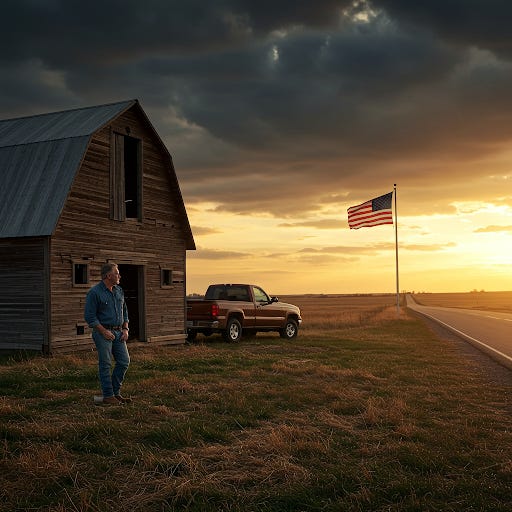
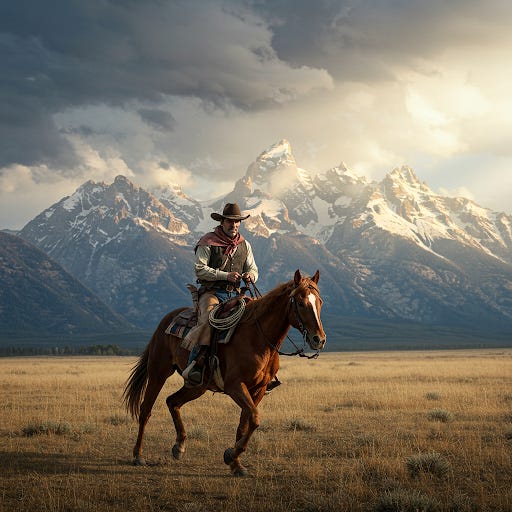
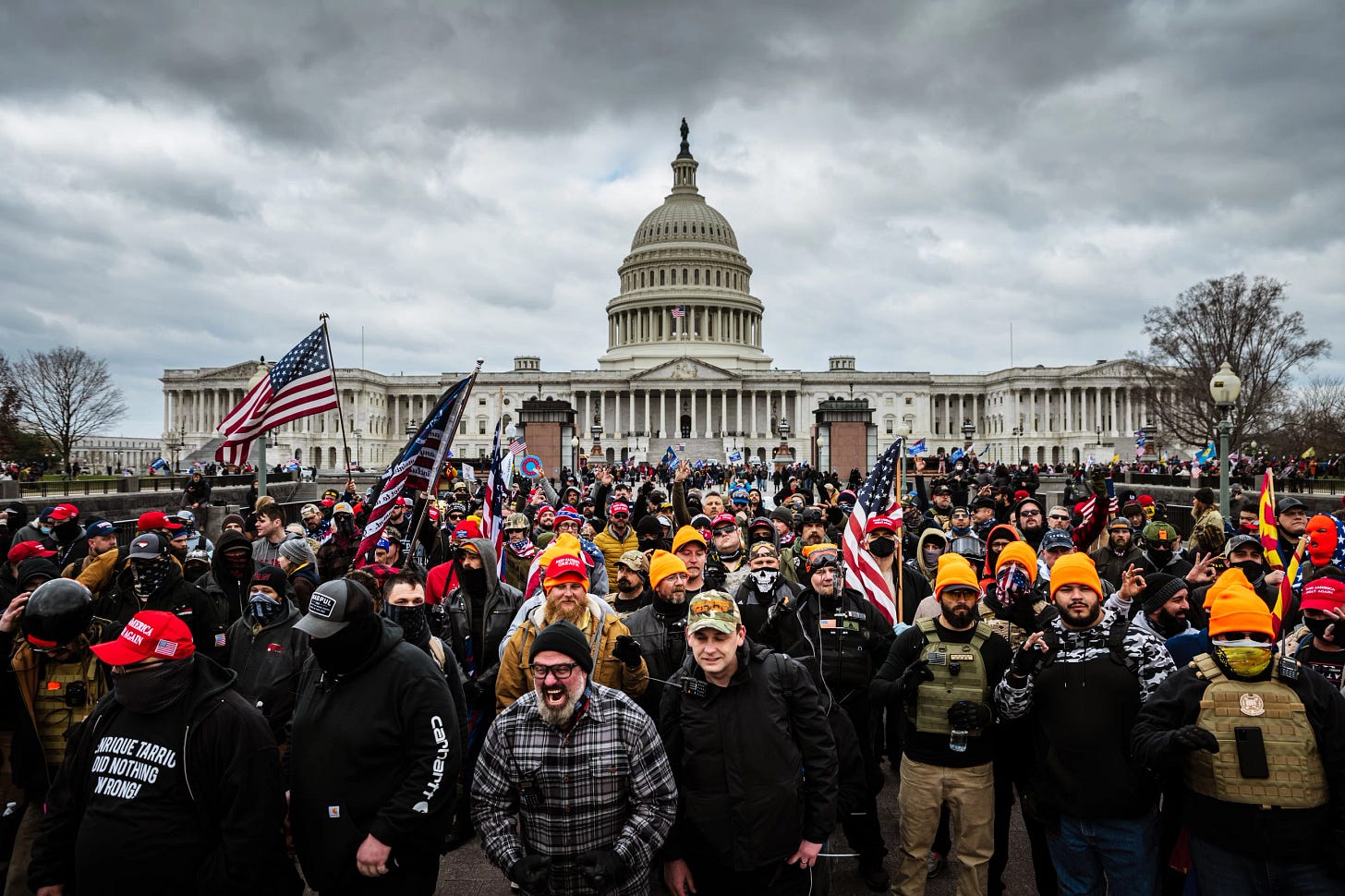
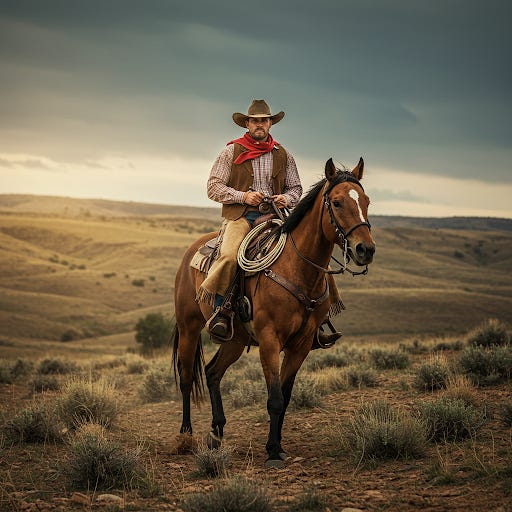


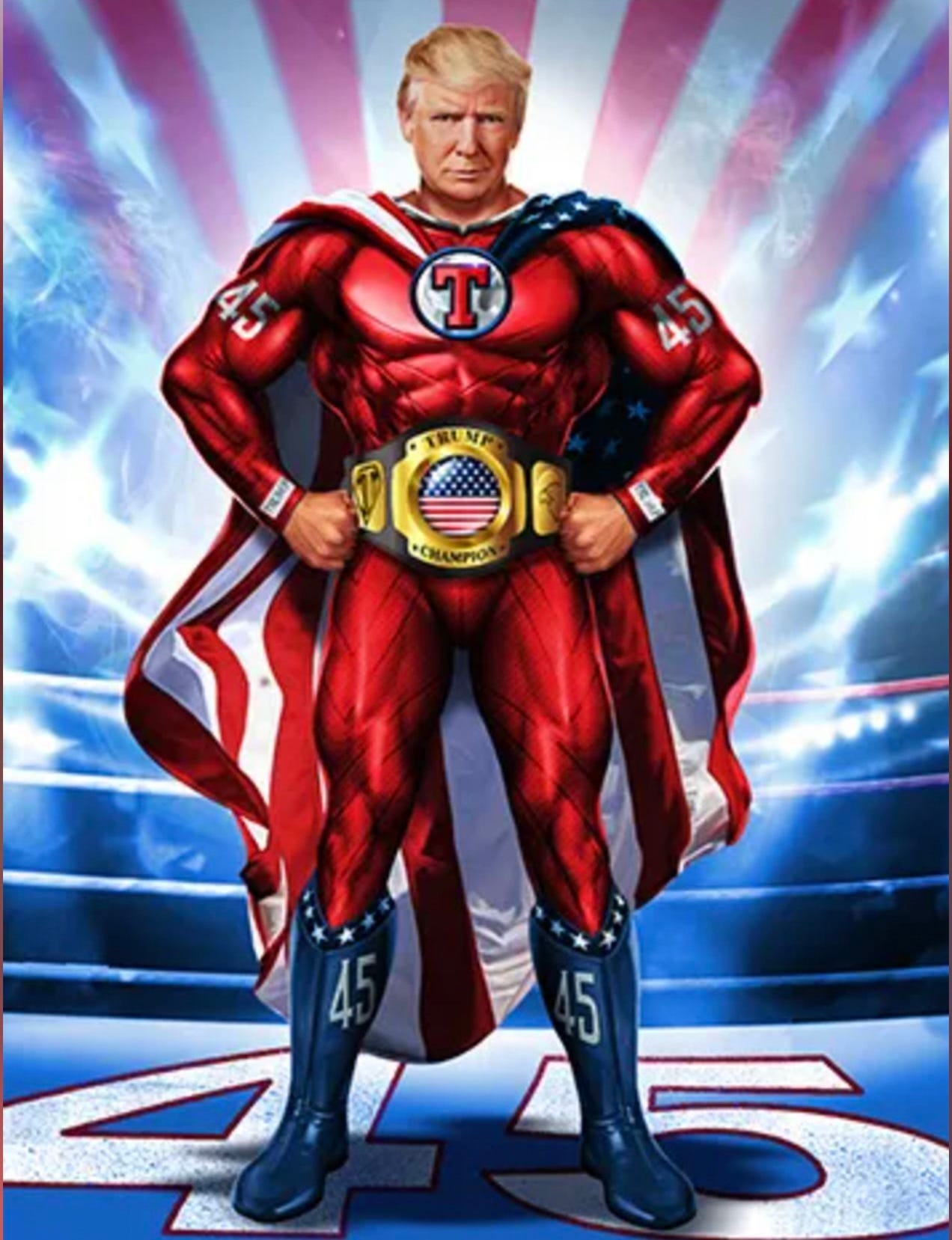

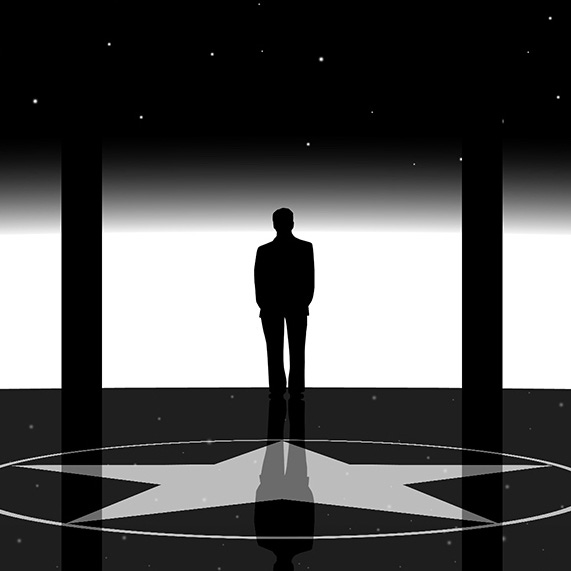
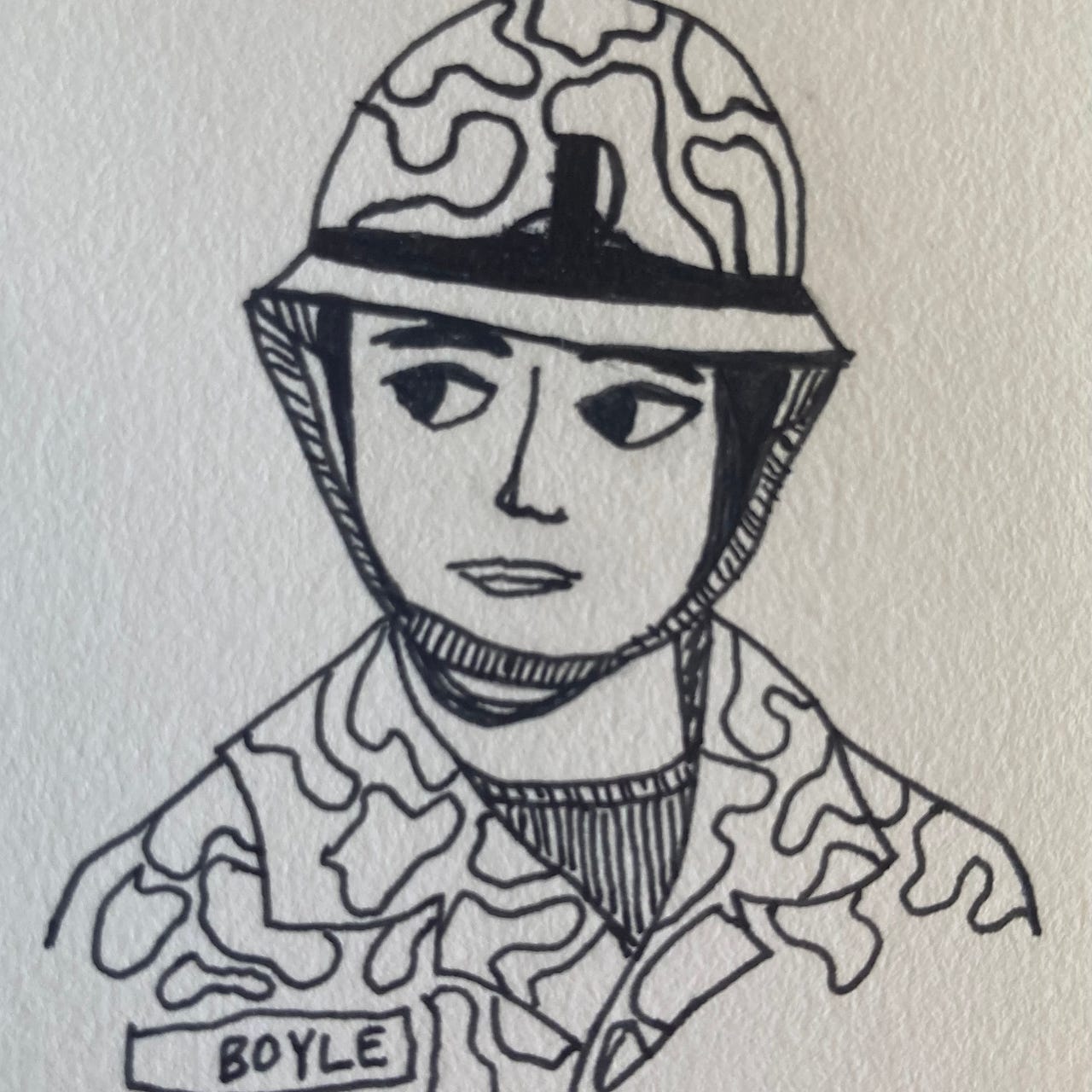
Ooooh, this is some painful-but-true stuff!